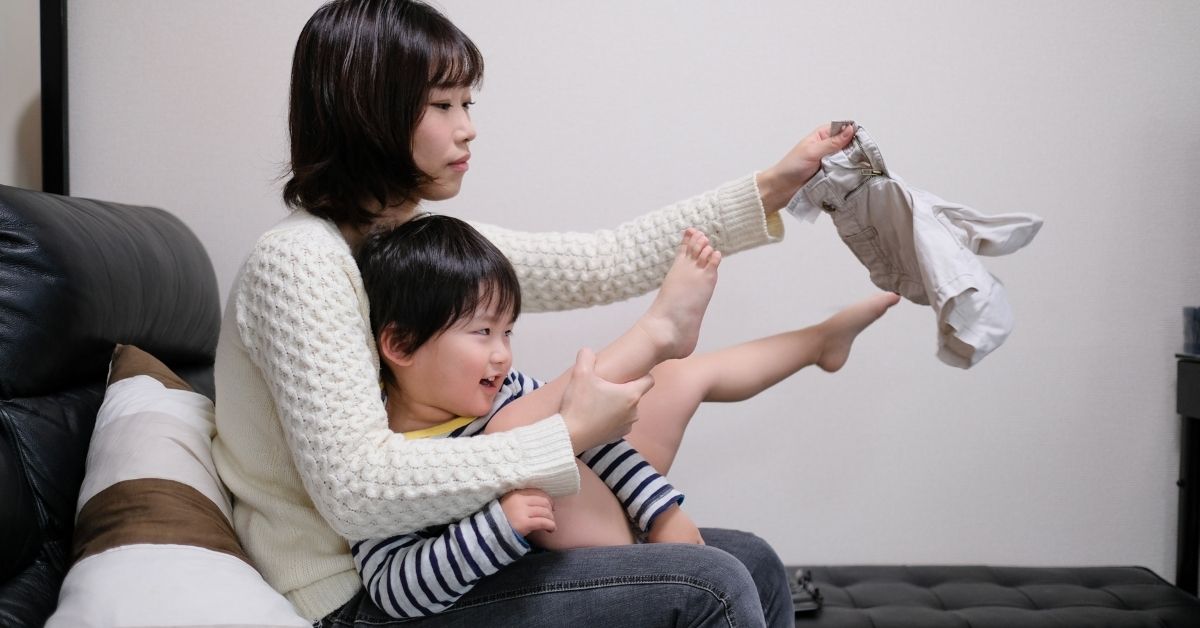Children Dressing Themselves, A Skill That Encourages Independence And Develops Gross And Fine Motor Skills. If this sounds like a cute and innocent topic to you, you’re half right. Of course, it is hilarious and very cute to teach toddlers to dress themselves but it is no easy task. Toddlers are hyperactive and they have very narrow attention spans, making it tough to teach them anything. However, kids dressing independently is a major developmental milestone. It is also a critical life skill which helps in developing a child’s gross and fine motor skills. Here are a few tips on how to teach children to dress themselves.
1. One Step At A Time
It is okay to expect adults to learn complex tasks by simply observing them being done, but the same can’t work with children. Dressing themselves is a more complex task for children than we might realize. Dressing independently requires gross and fine motor skills which toddlers don’t have yet, so you must be patient. A simple tactic can help simplify this task massively for both you and your child. Every day while you’re getting them dressed after their baths, explain what you’re doing and why. Some parents even make up their own songs or rhymes to help kids remember what goes where. You could try that or look for already made songs on the internet.
2. Visual Lessons
Putting on clothes for kids is usually the parent’s job, so much so that the child is completely uninvolved in it mentally. This is why children don’t simply learn how to wear their own clothes just because they’ve been seeing you do it with them for a long time. The key is to let them have a visual memory of it. Research has proven that visual memory is the strongest kind of memory people usually have. So make it a point to demonstrate to your child the valuable life skill of dressing independently.
3. Keep It Simple!
Young children get confused very easily. So, try to keep your explanations and demonstrations as simple as humanly possible. Furthermore, when teaching toddlers to dress themselves, remember to start with simple clothes. If you begin by teaching them to put on fancy clothing with zippers and buttons in odd places, it might make it tougher for the child to understand how to wear everyday clothing. Teach them to wear easier, everyday garments first – elastic waistband pants before button and zip pants, for example.
4. Set Easy Learning Goals
It is a universal fact that incentives work better than punishments when you’re dealing with children. Accordingly, you should try to encourage your child to learn how to dress independently. An effective method of doing this is to give them tasks that they can achieve easily. This will raise their confidence and self-esteem and help them learn to put on their clothes on their own.
5. Showers of Praises!
Rest assured that your child is going to make a whole lot of absolutely hilarious mistakes while learning to dress themselves. From inside out clothes to wrong shoes on the wrong feet, there will be numerous common mistakes. It is important that your first reaction should not be laughter. For as long as the child doesn’t know what is funny and why, laughter will ruin his/her self-esteem. The same is true of dismissive or strict behaviour on your part. So even when your child has made a funny-looking boo-boo, first shower them with praises for their efforts. Only then proceed to gently point out the little mistakes they may have made. They’re much more likely to learn to dress independently if you use this approach.








